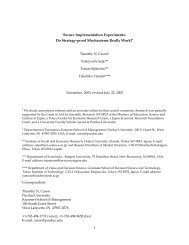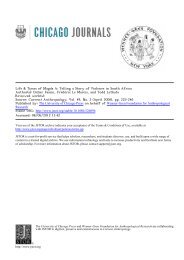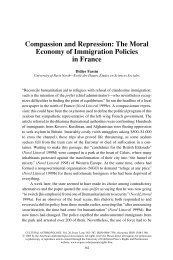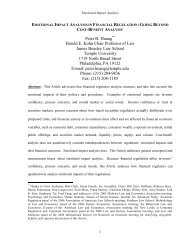Governance, Growth, and Development Decision-making - School of ...
Governance, Growth, and Development Decision-making - School of ...
Governance, Growth, and Development Decision-making - School of ...
You also want an ePaper? Increase the reach of your titles
YUMPU automatically turns print PDFs into web optimized ePapers that Google loves.
social cooperation. The natural state transformed human history;<br />
indeed, the first natural states developed techniques <strong>of</strong> building <strong>and</strong><br />
recording that resulted in the beginnings <strong>of</strong> recorded human history.<br />
Most <strong>of</strong> the world today still lives in natural states.<br />
Next, we consider the logic <strong>of</strong> the second new social order that<br />
emerged in a few societies at the end <strong>of</strong> the 18th, <strong>and</strong> beginning <strong>of</strong><br />
the 19th, centuries—the open access society. As with the appearance<br />
<strong>of</strong> natural states, open access societies transformed human<br />
history in a fundamental way. Perhaps 25 countries <strong>and</strong> 15 percent<br />
<strong>of</strong> the world’s population live in open access societies; the other 175<br />
countries <strong>and</strong> 85 percent live in natural states. Open access societies<br />
regulate economic competition in a way that dissipates rents <strong>and</strong><br />
uses competition to order social relations. Finally, we seek to explain<br />
how societies make the transition from natural states to open access<br />
societies.<br />
2. The Conceptual Framework<br />
In the primitive social order, human interaction occurs mainly<br />
through face-to-face repeated interaction; all relationships are<br />
personal. The typical size unit <strong>of</strong> human interaction is the b<strong>and</strong> <strong>of</strong><br />
about twenty-five people. The level <strong>of</strong> violence within, <strong>and</strong> between,<br />
groups is very high.<br />
The natural state provides a solution to violence by embedding<br />
powerful members <strong>of</strong> society in a coalition <strong>of</strong> military, political,<br />
religious, <strong>and</strong> economic elites. Elites all possess privileged access<br />
to valuable resources or valuable activities <strong>and</strong> the ability to form<br />
organizations sanctioned by the larger society. Limiting access to<br />
activities, organizations, <strong>and</strong> privileges produces rents for elites.<br />
Because these rents are reduced if violence breaks out, rent-creation<br />
enables elites to credibly commit to each other to limit violence.<br />
Moreover, because peace depends on the balance <strong>of</strong> interests<br />
within the dominant coalition, limited access orders are sensitive to<br />
changes that alter elite interests. As a result, natural states are stable<br />
but not static. In comparison with primitive orders, limited access<br />
10<br />
<strong>Governance</strong>, <strong>Growth</strong>, <strong>and</strong> <strong>Development</strong> <strong>Decision</strong>-<strong>making</strong>
















